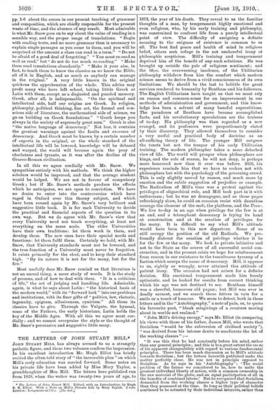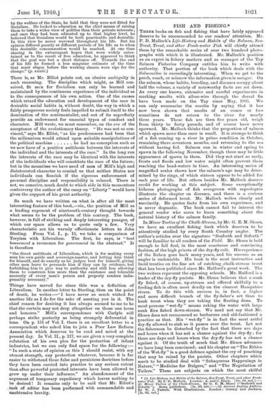THE LETTERS OF JOHN STUART MILL.* JOHN STUART MILL has
always seemed to us a strangely pathetic figure, and these two volumes confirm the impression. In his excellent introduction Mr. Hugh Elliot has briefly recited the often-told story of " the inexorable plan " on which Mill's early education was carried forward. Some notes on his private life have been added by Miss Mary Taylor, a granddaughter of Mrs. Mill. The letters here published run from 1829, when the writer was twenty-two years of age, to 4' The Letters of John Stuart Mill. Edited, with an Introduction, by Hugh S. B. Elliot. With a Note on Mill's Private Life by Mary Taylor. 2 vols. liondan Longinans ant Co. [21s. net.]
1873, the year of his death. They reveal to us the familiar - thoughts of a man, by temperament highly emotional and even religious, who, by his early training and philoaophy, was constrained to confront life from a purely intellectual point of view. The difficulty of assigning a definite meaning to the enigmas of existence is common to us all: The best find peace and health of mind in religious belief, others seek refuge in the not uncheerful irony of philosophic scepticism. Mill's training and temperament deprived him of the benefit of any such solutions. He was
brought up outside the pale of religious sentiment; and the 1;13pts, the overweening insolence, of the Utilitarian philosophy withdrew front him the comfort which modern science seems to derive from a vivid consciousness of its own
limitations. We should be the last to belittle the great services rendered to humanity by Bentham and his followers, The English Utilitarians have taught us that we must rely
on reason and common-sense for an improvement in our methods of administration and government, and this know- ledge has been a solvent of many baneful superstitions.
The paradoxes of Bentham have become accomplished facts, and his revolutionary speculations are the truisms of to-day. His philosophy was then regarded as a new evangel, and its professors were proportionately elated by their discovery. They allowed themselves to consider a very useful and practical body of doctrine as an all-sufficing theory of life. The younger Mill outgrew the tenets but not the temper of his early Utilitarian training. The modern philosopher takes a more detached view of life. The world will prosper when philosophers are
kings, and the rule of reason, he will not deny, is perhaps more honoured now than it ever was before. Still, his
experience reminds him that we have to reckon not with philosophers but with the psychology of the governing crowd. This is only slightly moved by reason, and much more by emotion and• the subtle suggestion of prejudice or example. The Radicalism of Mill's time was a protest against the_ privileges of oligarchical rule, and Mill took part in it with enthusiasm ; but he was no demagogue, and as these pages' refreshingly show, he could on occasion resist with dauntless courage the clamour of the mob, the platform, and the Press.
We live to-day in an-age when privilege for the few is at an end, and a triumphant democracy is trying its hand at construction and at the creation of privileges for the many. It is difficult to say what Mill's attitude would have been to this new departure. Some of us still occupy the position of the old Radicals. We pro- foundly distrust the creation of privilege whether it be for the few or the many. We look to private initiative and not to the State as the source of all successful social con- struction, and in the present crisis we hope for reinforcement from reason in' our resistance to the tumultuous tyranny of a faction which usurps the name of democracy. Mill, it appears to us, rightly or wrongly, never attained this attitude of patient irony. The occasion had not arisen for a definite decision. His emotional temperament made him keenly optimistic, and he looked for results from correct thinking which his age was not destined to see. Bentham himself was a cheerful, humorous old pagan; but Mill was ever in deadly earnest, and we search these letters in vain for a smile or a touch of humour. We seem to detect, both in these letters and in the "Autobiography," a note of pain, or, to quote his favourite poet, " blank misgivings of a creature moving about in worlds not realised."
" John Mill's driving energy," says Mr. Elliot (in comparing his views with those of his father, James Mill, who wrote that Socialism " would be the subversion of civilised society"), " was derived from his intense desire to ameliorate the lot of the working classes":--
" It was this that he had constantly before his mind, rather than any general principles ' • and this is to a great extent the ear so of his apparent changeability with regard to various fundamental principles. There has been much discussion as to Mill's attitude towards Socialism ; but the letters herewith published make the matter perfectly clear. He was not in principle opposed to Socialism. As he says in his Autobiography' : The social problem of the future we considered to be, how to unite the greatest iridividiuel liberty of action, with a' common ownership in the raw material of the globe, and an equal participation of all in the benefits of combined labour.' But he recognised that Socialism, demanded from the working classes a higher type of character than they possessed at the time. So long as their political beliefs continued to be actuated by their individual interests, rattler than by the welfare of the State, he held that they were not fitted for Socialism. He looked to education as the chief means of raising them to take a wider view of politics than their private interests ; and once they had been educated up to that higher level, he believed that Socialism would be both practicable and desirable. In this view he never wavered throughout his life. But his opinion differed greatly at different periods of his life as to when this desirable consummation would be reached. At one time sharing in the extravagant hopes that were widely enter- tained as to the result of free education, he appeared to think that the goal was but a short distance off. Towards the end of his life he formed a less sanguine estimate of the time that must elapse before the working classes were ripe for the change." (p.
There is, as Mr. Elliot points out, an elusive ambiguity in such reasoning. The discipline which might, as Mill con- ceived, fit men for socialism can only be learned and maintained by the continuous experience of the individual as to the consequences of his own action. One of the causes which retard the education and development of the race in desirable social habits is, without doubt, the way in which a fairly prosperous society feels impelled to submit itself to the domination of the sentimentalist, and out of its superfluity provide an endowment for unsocial types of conduct and character. Mill wrote, we must remember, on the eve of the acceptance of the evolutionary theory. " He was not so con- vinced," says Mr. Elliot, "as his predecessors had been that the millennium would attend upon suitable manipulations of the political machine he had no conception such as we now have of a positive antithesis between the interests of the individual and the interests of the race." In the long run the interests of the race may be identical with the interests of the individuals who will constitute the race of the future ; but in the meantime we have need of men of Mill's high and disinterested character to remind us that neither States nor individuals can flourish if the rigorous enforcement of personal discipline and responsibility is relaxed. There is not, we conceive, much doubt to which side in this momentous controversy the author of the essay on " Liberty " would have given the support of his great authority.
So much we have written on what is after all the most interesting feature of this book,—viz., the position of Mill as a leading exponent of nineteenth-century thought towards what seems to be the problem of this century. The book, however, is full of striking and deeply interesting pasages, of which our space allows us to quote only a few. Very characteristic are his warmly affectionate letters to John Sterling. From Vol. I., p, 15, we take a comparison of Toryism with Liberalism. The first, he says, is "tout bonnement a reverence for government in the abstract." It is therefore "the direct antithesis of Liberalism, which is for making every man his own guide and sovereign-master, and letting him think for himself, and do exactly as he judges best for himself, giving other men leave to persuade him if they can by evidence, but forbidding him to give way to authority and still less allowing them to constrain him more than the existence and tolerable necessity of every man's person and property renders indis- pensably necessary."
Things have moved far since this was a definition of Liberalism. In another letter to Sterling, then on the point of death, he writes :—" I have never so much wished for another life as I do for the sake of meeting you in it. The chief reason for desiring it has always seemed to me to be that the curtain may not drop altogether on those one loves and honours." Mill's correspondence with Carlyle will perhaps strike posterity as being strangely deferential in tone. On p. 151 of Vol. I. there is an excellent letter to a correspondent who asked him to join a Poor Law Reform Association which deserves to be read and noted at the present day. In Vol. II., p. 117, we are given a very complete refutation of his own plea for the protection of infant industries, but we can only find space for the following :— " In such a state of opinion as this I should resist, with my utmost strength, any protection whatever, because it is far easier to withstand these false and pernicious doctrines before they have been carried into practice to any serious extent than after powerful protected interests have been allowed to grow up under their influence." An abandonment of the argument of temporary expediency which leaves nothing to be desired ! It remains only to be said that Mr. Elliot's .,task of editor has been performed with commendable and unobtrusive brevity.











































 Previous page
Previous page